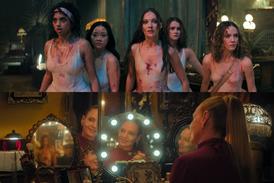Every cinema-producing country is always abuzz about which up-and-coming writers and filmmakers are worth watching. Cate Shortland is one of Australia's. Her script, More Than Scarlet, was one of four chosen from a field of 40 for last year's inaugural Aurora intensive scriptwriting workshop.
"I suddenly found myself in a room being asked really difficult questions and I had to acknowledge that I didn't have the answers," she says of the one-week residential workshop that kicked-off the initiative in April. "It was intense and fulfilling and far surpassed what I thought it would achieve."
Six months later professional actors were reading a new draft that had only two of the original scenes. Soon after, business-orientated advice on casting and financing options was being added to feedback about structure, story and character.
By the end of Aurora, the advice of a dozen highly qualified people including Jan Chapman (Lantana), Chris Noonan (Babe), Jan Campion (The Piano), as well as such international names as Geoff Stier (Mirage Enterprises), In The Bedroom writer Rob Festinger, Jason Resnick (Focus Features/Universal) and Tony Safford (Fox) had helped develop it into a final draft.
The film - about an adolescent girl's discovery of the difference between sex and love - has since won a commitment from local distributor Hopscotch and a television presale from SBS Independent. Producer Anthony Anderson is currently abroad trying to raise the production budget.
"Diversity of opinion is one of the things we were seeking," says development and finance manager Sally Browning from the New South Wales Film and Television Office (FTO), which was given $885,500 (A$1.5m) over three years for hot-housing scripts. "It allows us to provide more support over a shorter time frame to fewer scripts."
The second edition of Aurora, which will feature The Full Monty writer Simon Beaufoy, is now being moulded to fit the new teams which will be chosen from the 30 or so applications on Browning's desk.
"We have a terrific level of talent here but we also need international expertise because most projects made in Australia depend on international money," she says. "The different perspectives on character and setting from our US advisers was quite marked and that's terrific because it is a market we don't get into very often."
Yet Aurora is not the only Australasian development initiative. Across the Tasman Sea in New Zealand an Arista script development workshop is also being held this month organised by Film Victoria, The New Zealand Film Commission and Investment New Zealand. Later in February, eight teams come together for Spark, a joint venture between the Australian Film Commission and the Australian Film, Television & Radio School. Like Aurora it takes guidance from overseas models such as Sundance, Moondance and Equinoxe.
Among Spark's attendees are filmmaking couple Clara Law and Eddie Fong (The Goddess Of 1967) with Like A Dream, and writer/director Tony Ayres, who directed last year's critical hit Walking On Water and is now working with Michael McMahon on The Home Song Stories.
An up-and-comer mentioned as often as Cate Shortland is Jo Kennedy, who is writing Unlocked with Christine Rogers and will direct it.
"In the feature industry creative practitioners are very isolated, development is protracted and there are not many opportunities to bounce around ideas," says Carole Sklan, director of film development at the AFC. "Programs like this will encourage people to collaborate more between each other and create a ripple effect."
She is particularly pleased with the diversity of the projects selected from around 50 applications. There's a children's fantasy, a ghost story, a multi-narrative drama, and something very edgy and dark, to mention just a few of them. UK writer Jimmy McGovern (Priest) is one of Spark's advisers.
"We are pouring millions into script development in Australia for 15 to 20 films (of a standard that will see them released) and we have got to look at a range of approaches to development," says Sklan. "You cannot keep doing the same thing and expect bold projects to emerge. It is also not just about compelling scripts but also about realistic financing plans, whether it be for a film for the arthouse market or a $11.7m (A$20m) picture."
"The number of projects we make in a year cannot suddenly jump from 25 to 70," adds Browning, acknowledging Australia's limited access to production financing. "But instead of 25 average films we might get 10 average films and 15 fantastic films."



















No comments yet